Public Dialogue: “Genocide of the Crimean Tatar people and Ways to Overcome its Consequences”
On May 17, the Holodomor Museum will host a public dialogue: “Genocide of the Crimean Tatar people and Ways to Overcome its Consequences”, timed to the 80s anniversary of the total deportation of the Crimean Tatars from the Motherland by the communist regime.
Organisers of the event:
- The National Museum of the Holodomor-Genocide;
- NGO “Crimean Tatar Resource Center”;
- Ukrainian Institute of National Memory.
The main speakers of the public dialogue:
Andrii Ivanets, candidate of historical sciences, leading researcher of the Holodomor Museum;
Eskender Bariiev, Chairman of the Board of the Crimean Tatar Resource Center, member of the Mejlis of the Crimean Tatar People.
During the event, it is planned to discuss the topics: “Genocide of the Crimean Tatar people: total deportation and forced detention in places of deportation” and “Recognition of the deportation of the Crimean Tatar people as genocide in the world: problems and achievements.”
“During the Second World War, Crimea was subjected to ethnic cleansing and genocide by both totalitarian regimes – communist and Nazi. But the crime against the Crimean Tatar people has a special place among them, says Andrii Ivanets. – A large number of Ukrainians were deported in the Stalinist USSR, however, even against the background of these mass crimes, the forced eviction of the indigenous people from Crimea is particularly cynical. During the dialogue, we will discuss how and why the genocide was committed against the Crimean Tatars, an important element of which is its silencing. A member of the Mejlis of the Crimean Tatar people, Eskender Bariiev, will talk about how the process of recognition of the deportation of the indigenous people of Crimea as genocide by the countries of the world is progressing.”
When: Friday, May 17, 2024 at 4:00 p.m
Where: Memorial Hall of the Holodomor Museum (Kyiv, Lavrska St., 3).
Entry is free with prior registration: http://surl.li/tngfb
Reference. On May 18–20, 1944, the USSR authorities evicted more than 190,000 Crimean Tatars from Crimea, the absolute majority of whom were women, children, and the elderly. Later, about 10,000 Crimean Tatars were demobilised from the USSR army and also sent to places of exile. According to various estimates, from 20 to 46% of Crimean Tatars died in the first years of deportation. Their mass return to Crimea began only in the late 1980s and early 1990s. In 2015, the Verkhovna Rada of Ukraine recognised the deportation of the Crimean Tatar people as genocide. In the following years, three other states also qualified this crime as genocide.
